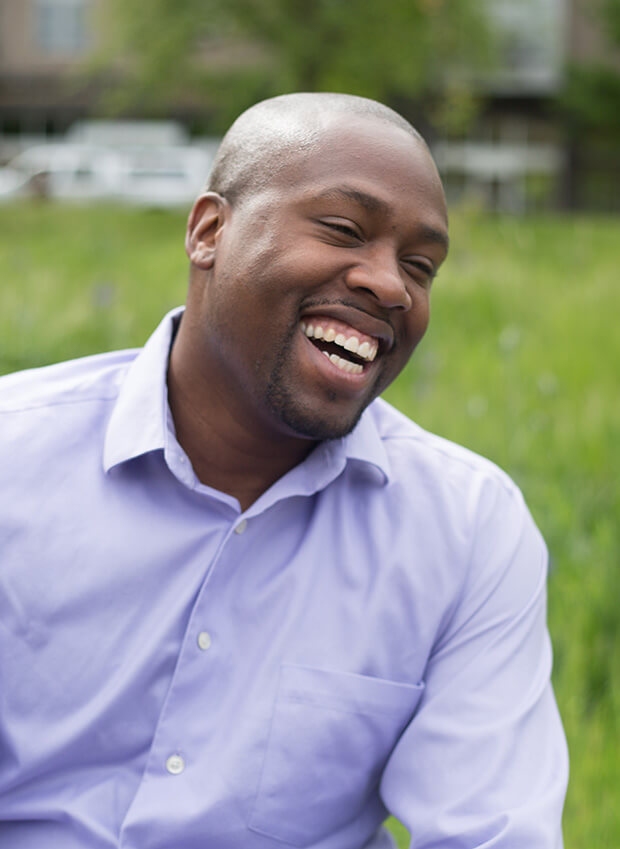
Everyday Leaders
Written by Bruce Poinsette Photos by Justin Katigbak & Intisar Abioto
Leaders of color are changing the landscape of both activism and entrepreneurship in Oregon by creating and cultivating spaces that directly tap into community needs.
Talilo Marfil, Candace Kita, James Parker, Mya Gordon, and Tyrone Poole are just a few examples of the leaders doing this work in their everyday lives. While they represent different communities, interests, and life experiences, they all share a passion for problem-solving and empowering their communities in innovative ways.
“If you want to solve big problems, get some fresh eyes,” says Tyrone Poole, founder of OneApp, an online service that eliminates multiple housing application fees by showing renters what they qualify for beforehand. Poole’s game-changing housing app was the result of a long process that started when he became homeless. While volunteering at the Young Women’s Christian Association, Poole began developing the idea of a book to make the housing search easier. He then reached out to local homeless advocates and nonprofits, only to find that the book became outdated within months because of constantly changing housing information. Motivated by the feedback, Poole retooled the book into OneApp, which has since seen tens of millions of downloads.
His entrepreneurial success—which was spearheaded predominantly by initial investments from Portland’s Black community as well as support through Prosper Portland’s Startup PDX Challenge program—grants him a different level of influence in places like Portland City Hall. For example, recently
proposed fair housing recommendations from the City Council were based largely on information extrapolated from OneApp data. In addition to the City, Poole works with organizations like the Community Alliance of Tenants and Multifamily NW to continue advocating on behalf of those in need of housing. He also offers up his time to mentor emerging entrepreneurs and readily shares his wisdom at speaking engagements such as TEDxPortland.
Poole’s leadership requires working with a variety of stakeholders and an understanding that people with lived experience and innovative solutions
“I’m a voice for Filipino people, low-income people, homeless youth, gang culture, and incarceration. Just being somebody that can represent at these tables and have tattoos on my face… translate[s] realities to people in a way they can understand”
– Talilo Marfil
don’t need to wait for permission from traditional powers to put those ideas into action.
Talilo Marfil, a youth mentor and artist, has created and contributed to numerous outreach projects both in Portland and Klamath Falls, including teaching homeless youth videography and helping them produce films through Outside the Frame; teaching music at the MacLaren Youth Correctional Facility; teaching boxing at Knotts Street; organizing and hosting various fundraisers for causes like homeless youth support; and running multiple youth centers. Behind the scenes, Marfil advocates to make sure different perspectives are represented in City Council and advisory board policy discussions.
“You have to tap into the people who actually live it,” says Marfil. “I’m a voice for Filipino people, low-income people, homeless youth, gang culture, and incarceration. Just being somebody that can represent at these tables and have tattoos on my face…. translate[s] realities to people in a way they can understand.”
Marfil feels rewarded by being able to both give back to young people who came up like him and develop the next generation of leaders who will go on to represent the voices currently going unheard. Originally from the Philippines, he spent much of his early years in Oregon—first in Klamath Falls and later in Portland—in and out of trouble. Hanging out with gang members and acting out eventually landed him a felony conviction and prison time. Upon release, the conviction prevented him from attaining housing and pursuing a career. However, it also ignited a fire in Marfil to help others avoid the same struggles, both by enhancing the programs that supported him and creating new spaces to deepen the work.
“It feels good to be in a position to hire people and get people jobs,” says Marfil. “And not just any job, but a job where you’re making a difference. If you’ve got scars or trauma, the best way to deal with that is by sharing it with other people. It validates your pain. It shows that you didn’t go through that for nothing.”
Candace Kita is a cultural worker with the Asian Pacific American Network of Oregon (APANO) and co-founder of Arts Workers for Equity (AWE).
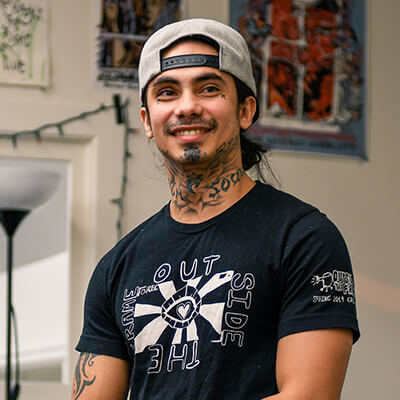
Talilo Marfil
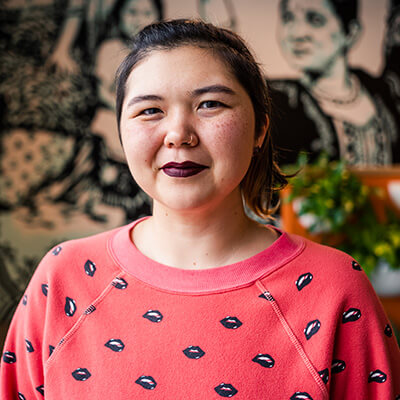
Candace Kita
Through her work with APANO, Kita has centered the culturally specific needs of the various communities represented under the Asian American and Pacific Islander (AAPI) umbrella and used the arts to amplify these needs to the rest of the city. This includes activities like pedestrian bridge mural projects with the Portland Bureau of Transportation and hosting workshops on topics like mental health in the AAPI community. Her work with AWE seeks to further these discussions by specifically focusing on the politics of Portland’s arts sector and intentionally challenging white dominant culture.
“I’ve seen and felt the kind of repercussions that not being represented has,” says Kita. “That’s a personally impactful motivation for wanting to create a different kind of arts world. If we want to create a better and more just future, we need to be able to dream and think and imagine at a very big scale and be very creative about it.”
Kita also advocates for fair pay for artists at every opportunity. For her, the art and social issues faced by marginalized communities are intertwined. That means directly and unapologetically addressing funding.
“How does our community participate in the artmaking process and how does that allow us to envision a different reality for the social issues we face?” asks Kita. “Who gets funded? Who gets represented?”

I understand that government agencies […] have a role to play […] We want to bring that to the forefront.
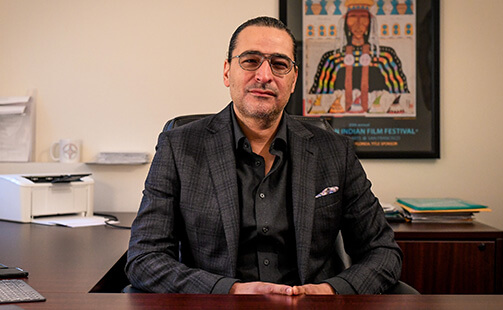
- James Alan Parker
James Alan Parker (Chippewa-Cree), Executive Director of the Oregon Native American Chamber (ONAC), has led an organizational shift towards centering the needs of entrepreneurs. ONAC has moved from an emphasis on networking events and reliance on membership dues to an approach that also leverages financial support from partners and stakeholders who’re committed to ONAC’s newly restated core tenets: education, building relationships, economic justice, growth and transformation.
Parker travels throughout the state to reframe ecosystem building for American Indians and Alaskan Natives, as well as the role of other stakeholders to reach the underserved and underrepresented. “I understand that government agencies, foundations and philanthropy have a role to play in supporting different approaches and more equitable solutions for helping native entrepreneurs and small businesses,”says Parker. “We want to bring that to the forefront.”
Utilizing his background in IT problem-solving and emphasizing community building, Parker has steadily worked to shift the organization’s business model to put the entrepreneur first and be more responsive to community needs. His influence can be seen with Affiliated Tribes of Northwest Indians and the National American Indian Housing Council.
Parker credits much to his parents, who were strong community leaders, helped him understand the sacrifices that were made, and instilled a sense of duty to advocate for people who are woefully underrepresented, under-resourced, and facing the weight of decades of disenfranchisement. Parker keeps a steady focus on how his work will positively impact future generations and continues to step back and listen to his community.
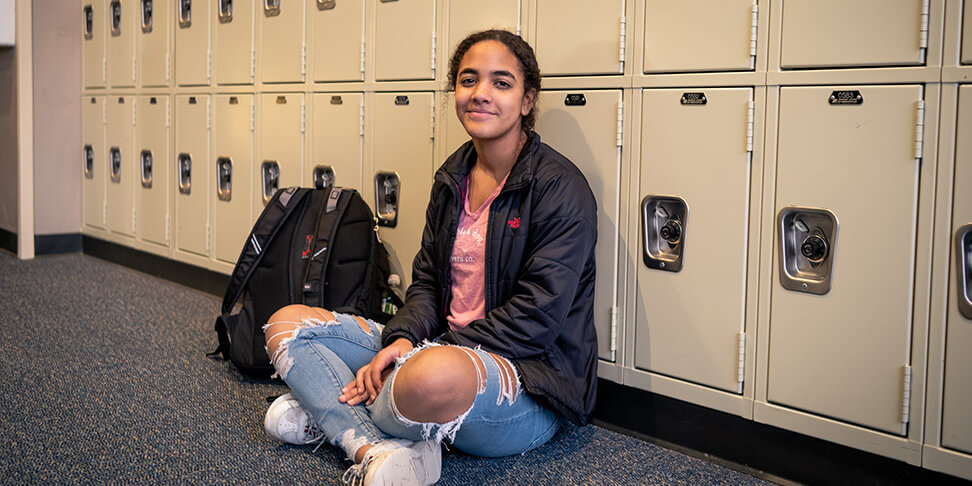
Mya Gordon
Mya Gordon lives and organizes in Lake Oswego, a town infamously known as “Lake No Negro” where the conversation around funding and equity is effectively brand new. Gordon is co-chair of the Lake Oswego School District’s Diversity Equity and Inclusion Advisory Committee; founder and president of Lakeridge High School (LHS) Equity Council; and member of the first LHS Black Student Union.
Gordon’s advocacy is persistent and effective. Working with classmates, Gordon successfully lobbied LHS administrators to provide funding specifically for equity efforts, which the LHS Equity Council has used to hire speakers and host programming for students.
As a student of color, Gordon has experienced discrimination and otherwise suffered because of lack of representation. “My experiences in Lake Oswego have shaped my identity…. I do what I do so I can help other people, so they don’t have to go through what I went through.
“Living here and doing all this work with equity taught me that feeling empathetic and emotional toward other people doesn’t make you weak, it makes you strong,” says Gordon. “It forces you to build a community and feel connected with other people in a way you wouldn’t have before.”
Leadership Development Resources
Here’s a list of organizations you can follow to get started:
ASIAN PACIFIC AMERICAN NETWORK OF OREGON
This program is application-based and admits 15-20 participants per year. Through an organization-wide leadership development model, APANO aims to grow the analysis, skills and confidence of Asian and Pacific Islanders to take action to improve their lives and achieve social justice for future generations.
apano.org
Oregon Lead Program – NAYA Family Center
This transformative program builds leadership capacity across Native communities throughout Oregon. In this program we are guided by the Relational Worldview Model, and nurture leadership by affirming cultural identity through supportive peer-to-peer relationships.
nayapdx.org
Civic Leadership and Advocacy Latino Network Multifamily NW
All of our programs integrate civic engagement principles and empower Latinos to be advocates on issues that matter to Latinos—poverty, youth violence, and the academic achievement gap.
latnet.org
Black Leadership Academy – Portland African American Leadership Forum
The Leadership Academy centers on fellowship, mentorship, and project-based learning. Participants explore what it means to be a transformative Black leader through the historical context of the African Diaspora.
paalf.org
Bridges A Leadership Initiative for Oregon’s Communities of Color – Coalition of Communities of Color
The CCC envisions an Oregon where our communities of color self-organize, build our collective power, and our leaders are implementing community-driven strategies to obtain self-determination, wellness, justice, and prosperity.
coalitioncommunitiescolor.org
Related Articles
Related
Hey Doc
“Hey Doc Clinic specifically is looking to center the queer, trans, and BIPOC communities. Basically what we’re saying is that this is a safe space.” Montserrat Andreys | Founder Hey Doc Storytellers Story Credit: Red...
Yancy Handmade
“I want to sell you a piece of art, and for you to know who is behind this product, who is the artist, to show you the significance of it, for you to love the product and understand the culture behind it.” “Yo quiero venderte arte, y que usted sepa que es lo que hay...
Blind Insect Gallery
“You have five seconds to rent a space in another person’s brain,” Pepe Moscoso Pepe Moscoso | Founder Blind InsectHOW TO SELL MAGIC TO THE WORLD “You have five seconds to rent a space in another person’s brain,” Pepe...
